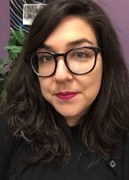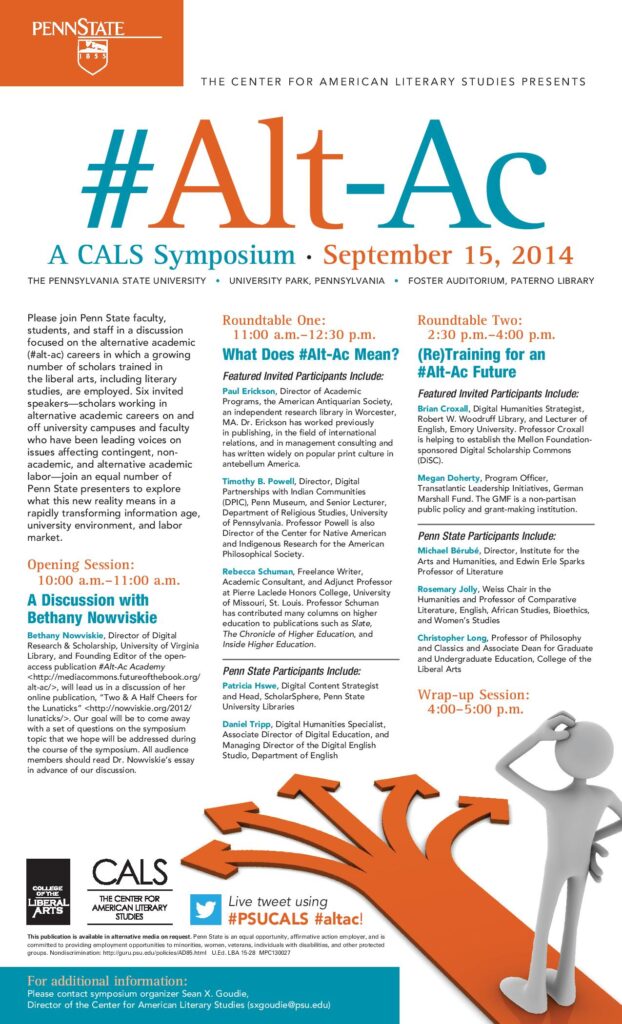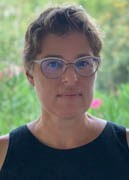Old School, New Futures: How Two Americanists Plan to Reimagine English Graduate Training


At its most crudely quantitative, the dilemma for English graduate students approaching the professorial job market amounts to too many qualified candidates and far too few commensurate positions. Faced with this predicament, Miriam Gonzales inverted the numbers game. “I was thinking about my professional future and trying to plan for it, and I realized that there was nothing in the department that was going to help me plan.” Catalyzed by individual urgency—“What about me?”—Gonzales envisioned a solution aimed at the department as a whole and the greater graduate student community. Now in the midst of its first year, that solution is the English Graduate Futures Initiative, for which Gonzales serves as Research Assistant under Director and Professor of English Hester Blum.
It is perhaps fitting that two former CALS team members—with Blum serving as Director (2007-10) and Gonzales as Graduate Research Assistant (2019-20)—should be at the command of such an Initiative, given the Center’s own history in addressing similar issues. In 2011, CALS’s first-ever Spring Symposium concerned the humanities in crisis, and the 2014 symposium, “#Alt-Ac,” directly tackled the non-tenure-track dimension of a PhD job market. But eight years later, much has changed, and the Initiative’s genesis reflects that difference.

In pitching the Initiative to both faculty and graduate students—to the English department’s Graduate Studies Committee and the English Graduate Organization, respectively—Gonzales set the foundation for the Initiative’s scope, which distinguishes it from previous, more unsystematic efforts in graduate programs at preparing graduate students for non-tenure-track jobs. As Blum explains, these efforts have been mostly restricted to an individual, case-by-case level: “Ten or fifteen years ago, the model to do this work was having a supportive advisor who’s willing to do it.” Similarly, alternative-academic training, or alt-ac, spotlighted “very idiosyncratic and very individualized” situations. For example, Bethanie Nowviskie, who helped trailblaze the alt-ac track a decade ago, carved out an “alternative” academic career in the Digital Humanities as the Director of Digital Research and Scholarship for the University of Virginia Library, which not only depended on a highly specialized skillset (Nowviskie’s PhD concentrated on the humanities and computing), but was also enabled by a singular institutional opportunity. This “traditional alt-ac path,” Gonzales notes, thus replaces one kind of scarcity with another: “it’s a very finite number of jobs, which also require a very particular set of skills or experience.”
The Graduate Futures Initiative aims instead to highlight the professional versatility of the skills and experiences all graduate students cultivate as part of their doctoral training, an aim that involves shifting the very terms on which graduate study is undertaken. This is necessary, according to Blum, because what distinguishes today’s job market crisis from previous iterations is its “systemic” nature: “academic jobs exist, but they’re not tenure-line jobs—they’re not positions that reflect the value and worth of the candidates.” Fittingly, then, the Initiative’s ambition is to facilitate long-term structural change, even as it also provides, in the short-term, resources that graduate students can take advantage of now.

In so doing, Blum and Gonzales are wary not to let the Initiative become categorized as yet another secondary “alternative,” the non-academic path beyond the tenure track. “The thing that’s important for us to convey to the department as a whole,” says Blum, “is that we are not looking to provide direct job counseling only to put people in industry or in corporate jobs; our aim is to create structures in the department for supporting teaching and research training that can lead not just to tenure track jobs but also to the huge variety of positions both within universities and in cultural organizations more broadly that can be served by a research and teaching PhD at a big institution.” Whether that means work in libraries or university administration, publishing houses or museums, information technology or public relations, the goal for the Initiative is to illuminate the English PhD’s flexibility in preparing students for a wide-range of jobs even as it continues to prepare them for more specialized academic positions.
Daunting though such a goal certainly is, the Initiative has been embraced by departmental leadership, an especially fortuitous sign given the importance not only of maintaining material support for the Initiative, but also of facilitating the perceptual shift that is necessary to motivate the structural impact Gonzales and Blum are hoping to achieve. As the Initiative works to provide new aspects to doctoral training, just as critical is the need to reframe the value of that training’s most fundamental components: research and teaching. As Blum explains, “these are skills that are broadly transferable, in the same way that the English department shares with undergraduates just how valuable their critical thinking, writing, and research skills are for any variety of post-BA jobs. The highly specialized PhD training similarly has a lot of applications.”
Such a commitment is reflected in the Initiative’s events this year, which have provided spaces for both faculty and graduate students to imagine different approaches to standard program procedures. In the fall, the Initiative held a workshop for graduate faculty on developing and instituting seminar assignments beyond the traditional journal-length essay. In addition, the Initiative has held two major roundtable events titled “Academic Jobs Beyond the Tenure Track,” which gathered panelists with English PhDs, from both within and outside of the Penn State community, to speak about their careers. Critically, these roundtables emphasized not so much on narrating individual paths to particular positions, but more so the necessity for students to cultivate an attitude of openness toward the possibilities of PhD training. Varied though their positions were—including academic positions like university librarians and program directors, and non-academic positions like project manager and podcast producer—the panelists across both roundtables endorsed the need to approach everyday graduate labor as a more flexible kind of training, rather than subordinating every action, in Gonzales’s words, “to the service of becoming a professor.”

Talley V. Kayser, Lecturer in English and Director of the department’s enormously popular Adventure Literature Series, spoke on the first “Beyond the Tenure Track” panel. In her remarks reflecting on that event, she emphasized the dangers of narrowing the possibilities that PhD training can offer: “Attachment to your labor or professional identity can make you vulnerable to exploitation, in academia and beyond.” For Kayser, being open to what the PhD can offer beyond the tenure track is part and parcel with being attuned to one’s own needs and values, and to make these integral rather than peripheral to graduate training. Rather than uncritically serving the “inherited values” of that training, which has traditionally privileged the professionalization aimed at tenure-track careers, Kayser emphasizes paying attention “to what conditions help you thrive, and equally close attention to what conditions make you wither,” and using that information to make decisions regarding one’s professional future.
The perspectival shift that Kayser describes is thus one that empowers graduate students to take charge of their training, and this is consistent with the Initiative’s mission. For Gonzales, “That willingness to be in charge of what you are doing, and not let your advisor or colleagues make those decisions for you, is huge.” It enables graduate students to take full advantage of the myriad opportunities available to them, “whether that’s working as an RA on a professor’s monograph, or as part of a research center or institute.” Indeed, it was precisely this kind of experience for Gonzales herself that illuminated the possibilities of graduate work: she counts her time as research assistant for CALS as “formative” in providing a fuller sense of “what academic work can entail.” With the Initiative as a structural institutional presence available to students “from day one,” Blum and Gonzales hope to make those kinds of experiences the norm.
In terms of the Initiative’s own future, this means, in the short term, fostering more concrete connections both within the department and with spaces outside of it to expand the opportunities available to graduate students. On the department side, Blum and Gonzales plan to integrate Initiative programming with already established features of the graduate program explicitly designed to support and advise students, like ENGL 501—the research and training course all new graduate students take—and the mentoring program. But Gonzales also emphasized the importance of “building connections outside of this department to help people explore new kinds of work.” While there are any number of possibilities for these connections, the first step, as Blum notes, is creating the logistical institutional channels necessary to make extra-departmental work “more commonplace.”
It will, in the best case, be a future almost impossible to predict, because constituted by new, so-far unimagined structures. In Blum’s words, “It’s about expanding everybody’s imagination of what’s possible”—and the Initiative itself, a product of Gonzales’s determination to not just imagine more from her graduate training, but also expect and enact it, stands as a testament to the power of that imagination.


At its most crudely quantitative, the dilemma for English graduate students approaching the professorial job market amounts to too many qualified candidates and far too few commensurate positions. Faced with this predicament, Miriam Gonzales inverted the numbers game. “I was thinking about my professional future and trying to plan for it, and I realized that there was nothing in the department that was going to help me plan.” Catalyzed by individual urgency—“What about me?”—Gonzales envisioned a solution aimed at the department as a whole and the greater graduate student community. Now in the midst of its first year, that solution is the English Graduate Futures Initiative, for which Gonzales serves as Research Assistant under Director and Professor of English Hester Blum.
It is perhaps fitting that two former CALS team members—with Blum serving as Director (2007-10) and Gonzales as Graduate Research Assistant (2019-20)—should be at the command of such an Initiative, given the Center’s own history in addressing similar issues. In 2011, CALS’s first-ever Spring Symposium concerned the humanities in crisis, and the 2014 symposium, “#Alt-Ac,” directly tackled the non-tenure-track dimension of a PhD job market. But eight years later, much has changed, and the Initiative’s genesis reflects that difference.

In pitching the Initiative to both faculty and graduate students—to the English department’s Graduate Studies Committee and the English Graduate Organization, respectively—Gonzales set the foundation for the Initiative’s scope, which distinguishes it from previous, more unsystematic efforts in graduate programs at preparing graduate students for non-tenure-track jobs. As Blum explains, these efforts have been mostly restricted to an individual, case-by-case level: “Ten or fifteen years ago, the model to do this work was having a supportive advisor who’s willing to do it.” Similarly, alternative-academic training, or alt-ac, spotlighted “very idiosyncratic and very individualized” situations. For example, Bethanie Nowviskie, who helped trailblaze the alt-ac track a decade ago, carved out an “alternative” academic career in the Digital Humanities as the Director of Digital Research and Scholarship for the University of Virginia Library, which not only depended on a highly specialized skillset (Nowviskie’s PhD concentrated on the humanities and computing), but was also enabled by a singular institutional opportunity. This “traditional alt-ac path,” Gonzales notes, thus replaces one kind of scarcity with another: “it’s a very finite number of jobs, which also require a very particular set of skills or experience.”
The Graduate Futures Initiative aims instead to highlight the professional versatility of the skills and experiences all graduate students cultivate as part of their doctoral training, an aim that involves shifting the very terms on which graduate study is undertaken. This is necessary, according to Blum, because what distinguishes today’s job market crisis from previous iterations is its “systemic” nature: “academic jobs exist, but they’re not tenure-line jobs—they’re not positions that reflect the value and worth of the candidates.” Fittingly, then, the Initiative’s ambition is to facilitate long-term structural change, even as it also provides, in the short-term, resources that graduate students can take advantage of now.

In so doing, Blum and Gonzales are wary not to let the Initiative become categorized as yet another secondary “alternative,” the non-academic path beyond the tenure track. “The thing that’s important for us to convey to the department as a whole,” says Blum, “is that we are not looking to provide direct job counseling only to put people in industry or in corporate jobs; our aim is to create structures in the department for supporting teaching and research training that can lead not just to tenure track jobs but also to the huge variety of positions both within universities and in cultural organizations more broadly that can be served by a research and teaching PhD at a big institution.” Whether that means work in libraries or university administration, publishing houses or museums, information technology or public relations, the goal for the Initiative is to illuminate the English PhD’s flexibility in preparing students for a wide-range of jobs even as it continues to prepare them for more specialized academic positions.
Daunting though such a goal certainly is, the Initiative has been embraced by departmental leadership, an especially fortuitous sign given the importance not only of maintaining material support for the Initiative, but also of facilitating the perceptual shift that is necessary to motivate the structural impact Gonzales and Blum are hoping to achieve. As the Initiative works to provide new aspects to doctoral training, just as critical is the need to reframe the value of that training’s most fundamental components: research and teaching. As Blum explains, “these are skills that are broadly transferable, in the same way that the English department shares with undergraduates just how valuable their critical thinking, writing, and research skills are for any variety of post-BA jobs. The highly specialized PhD training similarly has a lot of applications.”
Such a commitment is reflected in the Initiative’s events this year, which have provided spaces for both faculty and graduate students to imagine different approaches to standard program procedures. In the fall, the Initiative held a workshop for graduate faculty on developing and instituting seminar assignments beyond the traditional journal-length essay. In addition, the Initiative has held two major roundtable events titled “Academic Jobs Beyond the Tenure Track,” which gathered panelists with English PhDs, from both within and outside of the Penn State community, to speak about their careers. Critically, these roundtables emphasized not so much on narrating individual paths to particular positions, but more so the necessity for students to cultivate an attitude of openness toward the possibilities of PhD training. Varied though their positions were—including academic positions like university librarians and program directors, and non-academic positions like project manager and podcast producer—the panelists across both roundtables endorsed the need to approach everyday graduate labor as a more flexible kind of training, rather than subordinating every action, in Gonzales’s words, “to the service of becoming a professor.”

Talley V. Kayser, Lecturer in English and Director of the department’s enormously popular Adventure Literature Series, spoke on the first “Beyond the Tenure Track” panel. In her remarks reflecting on that event, she emphasized the dangers of narrowing the possibilities that PhD training can offer: “Attachment to your labor or professional identity can make you vulnerable to exploitation, in academia and beyond.” For Kayser, being open to what the PhD can offer beyond the tenure track is part and parcel with being attuned to one’s own needs and values, and to make these integral rather than peripheral to graduate training. Rather than uncritically serving the “inherited values” of that training, which has traditionally privileged the professionalization aimed at tenure-track careers, Kayser emphasizes paying attention “to what conditions help you thrive, and equally close attention to what conditions make you wither,” and using that information to make decisions regarding one’s professional future.
The perspectival shift that Kayser describes is thus one that empowers graduate students to take charge of their training, and this is consistent with the Initiative’s mission. For Gonzales, “That willingness to be in charge of what you are doing, and not let your advisor or colleagues make those decisions for you, is huge.” It enables graduate students to take full advantage of the myriad opportunities available to them, “whether that’s working as an RA on a professor’s monograph, or as part of a research center or institute.” Indeed, it was precisely this kind of experience for Gonzales herself that illuminated the possibilities of graduate work: she counts her time as research assistant for CALS as “formative” in providing a fuller sense of “what academic work can entail.” With the Initiative as a structural institutional presence available to students “from day one,” Blum and Gonzales hope to make those kinds of experiences the norm.
In terms of the Initiative’s own future, this means, in the short term, fostering more concrete connections both within the department and with spaces outside of it to expand the opportunities available to graduate students. On the department side, Blum and Gonzales plan to integrate Initiative programming with already established features of the graduate program explicitly designed to support and advise students, like ENGL 501—the research and training course all new graduate students take—and the mentoring program. But Gonzales also emphasized the importance of “building connections outside of this department to help people explore new kinds of work.” While there are any number of possibilities for these connections, the first step, as Blum notes, is creating the logistical institutional channels necessary to make extra-departmental work “more commonplace.”
It will, in the best case, be a future almost impossible to predict, because constituted by new, so-far unimagined structures. In Blum’s words, “It’s about expanding everybody’s imagination of what’s possible”—and the Initiative itself, a product of Gonzales’s determination to not just imagine more from her graduate training, but also expect and enact it, stands as a testament to the power of that imagination.